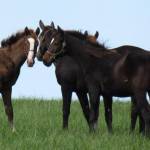Young Horse Management: Stress-Free Weaning

Multiple studies have confirmed what experienced horse breeders have known for decades: weaning induces a high level of stress in foals, potentially resulting in important health concerns, said Kathleen Crandell, Ph.D., a Kentucky Equine Research nutritionist.
Weight loss, also referred to as a growth slump, at the time of weaning, changes in the intestinal microbiota, and the development of gastric ulcers typically top the list of health issues associated with the weaning process. These health issues raise questions regarding the welfare of foals during the weaning process.
As summarized in a recent study*, weaning is recognized as an important welfare issue. Certain techniques, such as weaning individually, cause more stress than others, including natural weaning, gradually separating the mare and foal, and weaning either in groups or with one or more unrelated adults.
“Any steps that can be taken to minimize stress associated with weaning will improve the overall health and welfare of the foal and should be embraced,” Crandell advised.
She added, “High stress levels, which are associated with elevated levels of the hormone cortisol, can negatively impact all body systems, including the immune system. This makes foals susceptible to infection, parasitism, and reduced vaccination responses.”
Errors in feeding during weaning can result in devastating consequences, such as the development of orthopedic disorders like osteochondrosis and osteochondritis dissecans. For assistance in selecting feeds appropriate before and after weaning, consult a Kentucky Equine Research nutrition advisor.
“Owners may also wish to consider offering Triacton—a nutritional supplement developed by Kentucky Equine Research. Triacton contains important minerals to help with bone integrity, as well as a special calcium source that helps with stomach ulceration. These ingredients make Triacton a perfect product considering weaning is a vulnerable time for both bone and stomach problems,” shared Crandell.
*McGreevy, P., J. Berger, N. de Brauwere, et al. 2018. Using the five domains model to assess the adverse impacts of husbandry, veterinary, and equitation interventions on horse welfare. Animals (Basel). 8(3).








